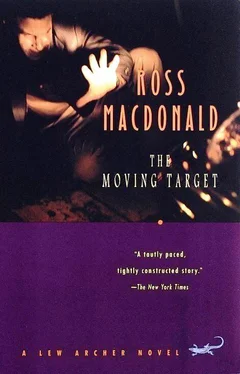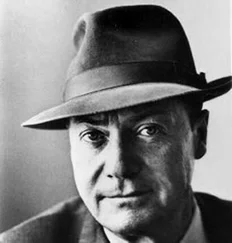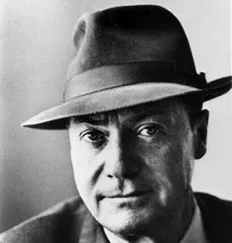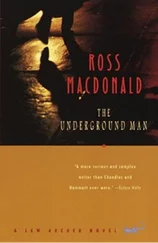“A one-third cut of tonight’s gross is thirty-three grand.”
“What?” He was startled, and his face showed it.
“You want me to spell it out for you?”
He recovered his poise immediately. “You mentioned thirty-three thousand. That’s a rather grandiose estimate.”
“One third of a hundred thousand is thirty-three thousand three hundred and thirty-three dollars and thirty-three cents.”
“What kind of a shakedown are you trying to pull?” His voice was anxious and harsh. I didn’t like all that tension converging on the gun.
“Forget it,” I said. “I wouldn’t touch your money.”
“But I don’t understand,” he said earnestly. “And you mustn’t talk in riddles. It makes me jumpy. It makes my hands nervous.” The gun moved in illustration.
“Don’t you know what goes on, Troy? I thought you knew the angles.”
“Assume that I don’t know anything. And talk fast.”
“Read it in the papers.”
“I said talk fast.” He raised the gun and let me look into its eye. “Tell me about Sampson and a hundred grand.”
“Why should I tell you your business? You kidnapped Sampson two days ago.”
“Go on.”
“Your driver picked up the hundred grand last night. Wasn’t it enough?”
“Puddler did that?” His impassivity had gone for good. A new expression had taken charge of his face, a killer’s expression, cruel and intent.
He went to the door and opened it, holding the gun between us. “Puddler!” His voice rose high and cracked.
“The other driver,” I said. “Eddie.”
“You’re lying, Archer.”
“All right. Wait for the cops to come and tell you in person. They know by now who Eddie was working for.”
“Eddie hasn’t the brains.”
“Enough brains for a fall guy.”
“What do you mean?”
“Eddie’s in the morgue.”
“Who killed him? Coppers?”
“Maybe you did,” I said slowly. “A hundred grand is a lot of money to a small-timer.”
He let it pass. “What happened to the money?”
“Somebody shot Eddie and took it away. Somebody in a cream-colored convertible.”
Those three words hit him behind the eyes and turned them blank for an instant. I moved to my right and swatted his gun with the palm of my left hand. It spun to the floor without discharging, and slid to the open door.
Puddler was in at the door and on the gun before me. I backed away.
“Do I let him have it, Mr. Troy?”
Troy was shaking his injured hand. It fluttered like a white moth in the circle of light from the lantern.
“Not now,” he said. “We’ve got to clear out of here, and we don’t want to leave a mess behind us. Take him to the pier on the Rincon. Use his car. Hold him there until I send word. You follow me?”
“I get it, Mr. Troy. Where are you going to be?”
“I don’t quite know. Is Betty at the Piano tonight?”
“Not when I left.”
“Do you know where she lives?”
“Naw – she moved the last couple weeks. Somebody lent her a cabin somewheres, I don’t know where–”
“Is she driving the same car?”
“The convertible? Yeah. She was last night, anyway.”
“I see,” Troy said. “I’m surrounded by fools and knaves as usual. They can’t keep their heads out of trouble, can they? We’ll show them trouble, Puddler.”
“Yessir.”
“Move,” Troy said to me.
They marched me out to my car. Troy’s Buick was standing beside it. The truck was gone. Claude and the brown men were gone. It was still black night, with the moon at its lower edge now.
Puddler brought a coil of rope from the shack beside the adobe.
“Put your hands behind you,” Troy said to me.
I kept my hands at my sides.
“Put your hands behind you.”
“So far I’ve been doing my job,” I said. “If you push me around some more, I’ll have a grudge against you.”
“You talk a great fight,” Troy said. “Quiet him, Puddler.”
I turned to face Puddler, not fast enough. His fist struck the nape of my neck. Pain whistled through my body like splintered glass, and the night fell on me solidly again. Then I was on a road. The road was crowded with traffic. I was responsible for the occupants of every car. I had to write a report on each, giving age, occupation, hobby, religion, bank balance, sexual proclivities, politics, crimes, and favorite eating places. The passengers changed cars frequently, like people playing musical chairs. The cars changed numbers and color. My pen ran out. of ink. A blue truck picked me up and changed to funeral black. Eddie was at the wheel, and I let him drive. I was planning to kill a man.
The plan was half complete, when I came to. I was wedged on the floor of my car between the front and back seats. The floor was vibrating with motion, and the pain in my head kept time. My hands were bound behind me again. Puddler’s wide back was in the front seat, outlined by the reflection of the headlights. I couldn’t get to my feet, and I couldn’t reach him.
I tried to work my hands loose from the rope, twisting and pulling until my wrists were raw and my clothes were wet. The rope held out better than I did. I threw my plan away and started another.
By dark untraveled roads we came down out of the mountains and back to the sea. He parked the car under a tarpaulin stretched on poles. As soon as the engine died I could hear the waves below us beating on the sand. He lifted me out by my coat collar and set me on my feet. I noticed that he pocketed my ignition key.
“Don’t make no noise,” he said, “unless you want it again.”
“You’ve got a lot of guts,” I said. “It takes a lot of guts to hit a man from behind while somebody else holds a gun on him.”
“You shut up.” He spread his fingers across my face and hooked them downward. They tasted of sweat, as rank as a horse’s.
“It takes a lot of guts,” I said, “to push a man in the face when his hands are tied behind him.”
“You shut up,” he said. “I shut you up for good.”
“Mr. Troy wouldn’t like that.”
“You shut up. Get moving.” He put his hands on my shoulders, turned me, and pushed me out from under the tarpaulin.
I was at the shore end of a long pier that was built out over the water on piles. There were oil derricks on the skyline behind me, but no lights. No movement but the sea’s, and the systole and diastole of an oil pump at the end of the pier. We walked toward it in single file, with Puddler at the rear. The planks of the footwalk were warped and badly put together. Black water gleamed in the cracks.
When we were about a hundred yards from shore I made out the pump at the end of the pier, rising and falling like a mechanical teeter-totter. There was a tool shed beside it, nothing but ocean beyond.
Puddler unlocked the door of the shed, lifted a lantern off a nail, and lit it.
“Sit down, mug.” He swung the lantern toward a heavy bench that stood against the wall. There was a vise at one end of the bench and a few tools scattered along it: pincers, wrenches of various sizes, a rusty file.
I sat down on a clear space. Puddler shut the door and set the lantern on an oil drum. Lit from below by the yellow flaring light, his face was barely human. It was low-browed and prognathous like a Neanderthal man’s, heavy and forlorn, without thought. It wasn’t fair to blame him for what he did. He was a savage accidentally dropped in the steel-and-concrete jungle, a trained beast of burden, a fighting machine. But I blamed him. I had to. I had to take what he’d handed me or find a way to hand it back to him.
“You’re in a rather unusual position,” I said.
He didn’t hear me, or refused to answer. He leaned against the door, a thick stump of a man blocking my way. I listened to the thump and creak of the pump outside, the water lapping below against the piling. And I thought over the things I knew about Puddler.
Читать дальше












